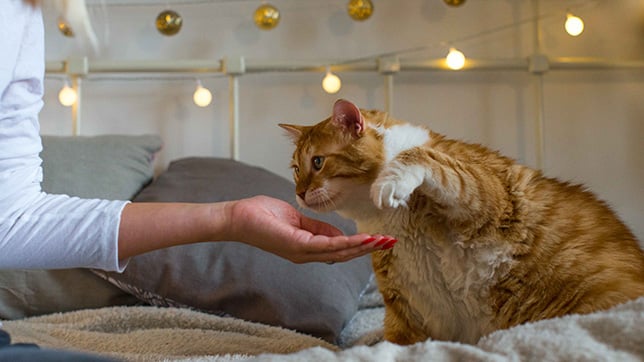28th October 2021
How can I tell if my pet is obese
Obesity can be defined as excessive body fat which can put our pets at risk of serious health problems and impact their quality of life. Sadly, pet obesity is an extremely common but preventable problem, with vets confirming that 51% of dogs and 44% of cats are now overweight.
How can i tell if my pet is overweight?
There are a few simple signs to look out for if you believe your pet is overweight:
- A layer of fat covering their ribs
- You struggle to see or feel their ribs, spine or waistline
- Their tummy bulges out and sags downwards
- A bigger, rounder face
- A reluctance to go for walks or falling behind when on one
- Excessive panting
- Getting tired easily
- Not wanting to move or play games
- Lack of self-grooming
What are the risks of obesity in pets?
When our pets live with obesity not only do they have a shortened life span but their quality of life is also affected. Obesity can cause serious health problems, such as:
Skin Conditions
Unfortunately, being an overweight dog or cat can result in some dermatological issues; how it effects their skin, nails and coats.
Pets that carry some extra weight might not be able to groom themselves as adequately as they could when they were thinner, meaning they could become prone to skin infections in skin and fat folds.
Diabetes
Basically, obesity can cause cells in your pet’s body to become more resistant to insulin, meaning they’re at an increased risk of developing diabetes.
With there being no cure for diabetes you and your pet will need regular visits to the vet to make sure your pet receives ongoing treatment.
Once a pet has diabetes, they are more prone to some other conditions like cataracts and urinary tract infections, which will mean more vet visits and a decreased quality of life.
Dysplasia
Being overweight or living with obesity is a big contributing factor to our pet’s bone and joint problems, including arthritis or hip dysplasia.
As our pet’s bones, joints, muscles, tendons and ligaments all work together in giving our cat or dog smooth movement, when these become damaged from carrying extra weight it can cause a lot of pain and discomfort.
This means obesity increases the risk of hip dysplasia and even slipped discs in certain dog breeds.
Heart disease
Unfortunately, weight gain can cause heart disease and high blood pressure in our pets. This is because their heart has to work a lot harder pumping additional blood to excess tissues around the body.
Breathing problems
When a dog or cat is overweight, their lungs can’t function properly as the additional fat can restrict the lungs as our pets try to breathe. This can lead to complications under anaesthesia if your pet ever needs to have an operation at the vet.

What causes obesity in pets?
There are several causes of obesity in cats and dogs, but it’s most commonly caused by an imbalance between energy intake and usage. Simply put, it means our pets are eating more calories than they need or are able to burn.
Weight gain can also be caused by certain medical conditions, recovery from surgery, medications, old age or genetics.
How can i prevent obesity in my pet?
Luckily, obesity can be easily prevented by ensuring your pet maintains a healthy diet and gets plenty of exercise.
Look at their food
Our pets need different portion sizes as they grow with specifically tailored food during their different life stages. Avoid giving your pet scraps from the table and cut down on the treats you give them to help them stay slim.
If you are confused about the type of diet your dog needs or the correct portion sizes, then don’t hesitate to speak to your vet.
Keep up their exercise
It’s important to ensure that your pet is exercised daily. From going on walks to playing games at home, every little activity you do with your cat or dog can help to keep the extra weight at bay.
How is pet obesity treated?
As with most conditions, prevention is better than the cure, but obesity is usually managed with gradual weight loss which is achieved by reducing your pet’s caloric intake and increasing their activity levels. This will vary depending on each animal, their breed, age and existing medical conditions so always seek veterinary advice before implementing a weight loss routine.
If you’re worried about your dog or cat’s health, always contact your vet.
Looking for more cat advice?
We’ve written some handy cat advice guides, to help you unlock the secrets of your mysterious moggy.
Need cat insurance?
Cat insurance can help cover the cost of veterinary treatment if your cat gets injured or falls ill.
We know pets
Our pets are part of the family. To achieve our vision of a better future for pets everywhere, we work with our partners, vets, and other veterinary professionals who are pioneering the latest advancements in animal care. Our campaigns, articles, and events are crafted to support, educate, and celebrate pet owners, while our policies are designed to provide peace of mind at an affordable price.
Yet our policies don’t just protect against the unexpected – they have purpose, too.
Since we were founded over 25 years ago, we've provided industry-leading policies that protect the nation’s pets, while also making a difference to animal welfare and our planet. Thanks to you, our policyholders, we've donated over £9 million to more than 830 animal welfare charities and conservancies, helping to support vulnerable pets and wildlife around the world.
We’re proud to be wildly different. Are you?
